
-
Trouvez la nourriture adaptée à votre animal de compagnieRépondez à ce quiz pour découvrir quelle alimentation conviendrait le mieux à votre compagnon à quatre pattes.Trouvez la nourriture adaptée à votre animal de compagnieRépondez à ce quiz pour découvrir quelle alimentation conviendrait le mieux à votre compagnon à quatre pattes.Produits recommandés
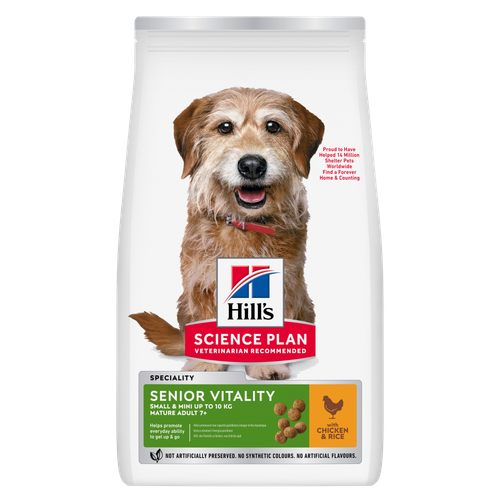 Senior Vitality - Croquettes pour Chien Mature (7+) - Petite Race - au Poulet et Riz
Senior Vitality - Croquettes pour Chien Mature (7+) - Petite Race - au Poulet et RizHill’s Science Plan Senior Vitality - Croquettes pour Chien au Poulet - Petite et très Petite Race Notre formule révolutionnaire favorise la capacité quotidienne de votre chien senior à se lever et à bouger.
Shop Now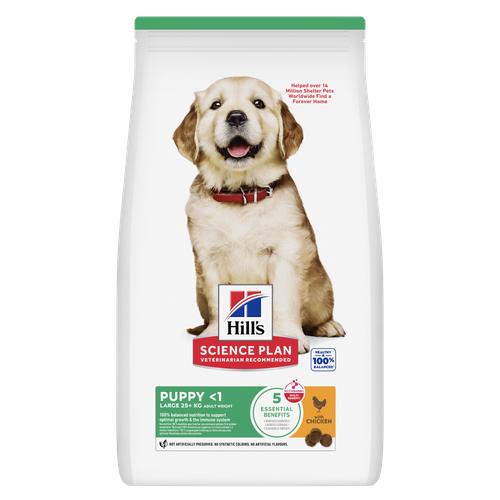 Puppy - Croquettes pour Chiot - Grande Race
Puppy - Croquettes pour Chiot - Grande RaceHill’s Science Plan Puppy - Croquettes pour Chiot au Poulet - Grande Race est un aliment complet spécialement formulé avec la technologie ActivBiome+ Multi-Benefit.
Aliment équilibré pour renforcer le système immunitaire et assurer une croissance optimale.Shop Now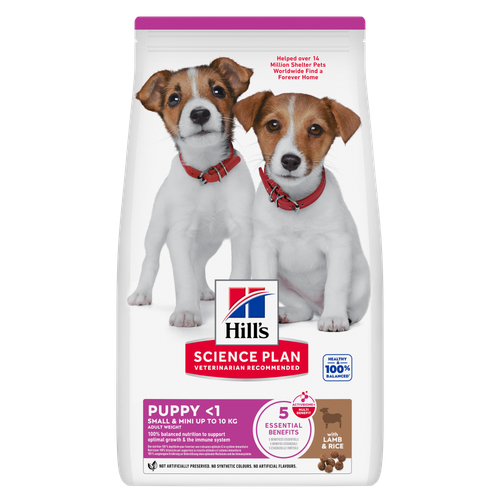 Puppy Small & Mini - Croquettes pour Chiot - Petite et très Petite Race
Puppy Small & Mini - Croquettes pour Chiot - Petite et très Petite RaceHill’s Science Plan Puppy Small & Mini - Croquettes pour Chiot à l’Agneau & Riz - Petite et très Petite Race est un aliment complet spécialement formulé avec la technologie ActivBiome+ Multi-Benefit.
Aliment équilibré pour renforcer le système immunitaire et assurer une croissance optimale.Shop NowProduits recommandés Hairball & Perfect Coat - Croquettes pour Chat Adulte - au Poulet
Hairball & Perfect Coat - Croquettes pour Chat Adulte - au PouletHill's Science Plan Hairball & Perfect Coat - Croquettes pour Chat Adulte - au Poulet a été formulé pour aider efficacement à éviter la formation de boules de poils chez le chat adulte tout en favorisant un beau pelage. Grâce à son mélange d’acides gras essentiels Oméga-6, cet aliment est bénéfique pour la peau et le pelage du chat, les maintenant sains et brillants. Notre technologie Advanced Fibre aide à réduire les boules de poils en favorisant naturellement leur passage dans l’intestin. Cet aliment est formulé avec des protéines de haute qualité pour une recette parfaitement équilibrée et savoureuse.
Shop Now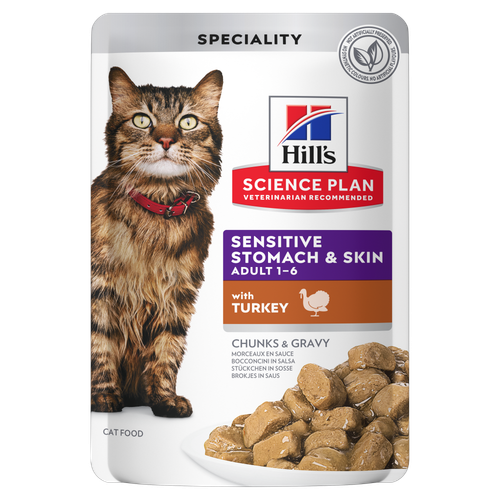 Sensitive Stomach & Skin - Sachet Repas pour Chat
Sensitive Stomach & Skin - Sachet Repas pour ChatHill’s Science Plan Sensitive Stomach & Skin Sachet Repas pour Chat Adulte à la Dinde est un aliment complet pour les chats adultes âgés de 1 à 6 ans. Cette alimentation hautement digestible se présente en sachet repas et favorise une meilleure digestion, nourrit la peau et rend le pelage épais et brillant.
Shop Now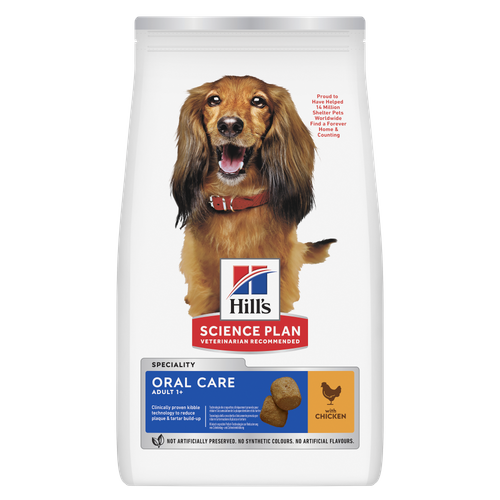 Oral Care - Croquettes pour Chat Adulte (1+)
Oral Care - Croquettes pour Chat Adulte (1+)Hill’s Science Plan - Oral Care - Croquettes pour Chat Adulte au Poulet sont des croquettes cliniquement prouvées pour réduire l’accumulation de plaque dentaire et de tartre.
Shop Now -
Pour chienPour chatArticles à la une
 Fêtez la nouvelle année avec ces résolutions pour vos animaux
Fêtez la nouvelle année avec ces résolutions pour vos animauxÀ la fin de l'année, de nombreuses personnes fête la nouvelle année en créant une liste de nouvelles habitudes à adopter (ou à abandonner !) pour améliorer leur santé et leur bonheur.
Read More Idées de jeux pour les enfants et les animaux cet été
Idées de jeux pour les enfants et les animaux cet étéLes activités d’été en plein air avec votre chien ou chat peuvent être tout aussi divertissantes pour les enfants. Découvrez comment ces activités leur enseignent le sens des responsabilités et les aident à créer des liens avec leurs animaux.
Read More Les bonnes résolutions pour la nouvelle année avec votre animal | Hill's Pet
Les bonnes résolutions pour la nouvelle année avec votre animal | Hill's PetÀ la fin de l'année, de nombreuses personnes fête la nouvelle année en créant une liste de nouvelles habitudes à adopter (ou à abandonner !) pour améliorer leur santé et leur bonheur.
Read More -


Your kitten is born to play
When it comes to playtime, your kitten is a natural; and will turn anything into a game. A piece of paper or foil screwed up into a ball, a pen cap, or any small object suspended by a piece of string; kittens simply can't resist the temptation to play. Better still, she'll be more than happy for you to join in the fun and games, which is why playtime develops a strong bond between the two of you.
A new world to explore
Being an inquisitive little creature, your new kitten will love to explore, especially covered spaces. A paper bag, an open cupboard or drawer, under the bed; an inquisitive kitten simply has to find out what's in there. So a word of warning; please don't leave the washing machine or tumble drier doors open as kittens have been known to become trapped inside. And whatever you do, don't leave that toilet seat up…


Conseils savoureux
Les chatons peuvent nécessiter plusieurs visites de vaccination au cours de leur première année. Les chats adultes bénéficient généralement d'un contrôle annuel, tandis que les chats âgés ou ayant des besoins spécifiques peuvent nécessiter des visites plus fréquentes.
Kitten's own toys
You can have loads of fun with kitten toys, especially small, soft toys. They can easily be batted about or picked up in her claws or teeth. And by playing hide and seek with a soft toy, the inborn hunting instinct will come into play and she'll have hours of fun tracking down her 'prey'. Give her a catnip toy and watch her roll around with happiness; catnip contains an ingredient called nepetalactone that cats love. But watch out, some cats react aggressively to catnip, while some don't react at all.
A kitten's natural curiosity might lead her to try taking a bite out of your house plants, and many of these can be poisonous. As a precaution, it's a good idea to check out what you have in your pots and keep any dangerous ones well out of reach. Lilies, poinsettias and cyclamens can be especially poisonous to cats.
Scratching from the start
Scratching and stretching are essential to your kitten's wellbeing, and your curtains or soft furnishings are almost certain to be an easy target. But give her a scratching post from day one and it should prove to be a useful distraction from your furniture. Better still, it will keep her claws in trim. If your kitten doesn't seem too keen on the scratching post at first, try sprinkling a little catnip around the base. Most cats can't resist the smell, so she might end up thinking the post isn't such a bad idea after all.
Kittens and kids are made for each other, eventually
It's hardly surprising that children simply adore kittens. But if they're under 5 years old, you're advised not to let them play with a kitten under 6 months. That's because they're very playful and their claws and teeth are very sharp; a very young child might not understand that the occasional scratch is all part of the game. It's wonderful for children to grow up with a pet in the family, and they'll develop a much happier relationship when both are old enough to understand the other.
Teach your children how to care for the new member of the family; how to play with her, what and how to feed her (not forgetting what not to feed her). And give them a sense of responsibility by taking their turn to wash up the food bowl. Irresistible though a kitten is, the children need to understand how much sleep she needs, and not to disturb her when she curls up in her bed to get some much needed rest.


L'un de nos auteurs a préparé cet article pour vous
Produits Similaires

Hill’s Science Plan Sensitive Stomach & Skin Sachet Repas pour Chat Adulte à la Dinde est un aliment complet pour les chats adultes âgés de 1 à 6 ans. Cette alimentation hautement digestible se présente en sachet repas et favorise une meilleure digestion, nourrit la peau et rend le pelage épais et brillant.

Hill’s Science Plan - Oral Care - Croquettes pour Chat Adulte au Poulet sont des croquettes cliniquement prouvées pour réduire l’accumulation de plaque dentaire et de tartre.

Hill's Science Plan Hairball & Perfect Coat - Croquettes pour Chat Adulte - au Poulet a été formulé pour aider efficacement à éviter la formation de boules de poils chez le chat adulte tout en favorisant un beau pelage. Grâce à son mélange d’acides gras essentiels Oméga-6, cet aliment est bénéfique pour la peau et le pelage du chat, les maintenant sains et brillants. Notre technologie Advanced Fibre aide à réduire les boules de poils en favorisant naturellement leur passage dans l’intestin. Cet aliment est formulé avec des protéines de haute qualité pour une recette parfaitement équilibrée et savoureuse.

Hill's Science Plan Hypoallergenic - Croquettes pour Chat Adulte à l'Oeuf et aux Protéines d'Insectes est un aliment complet pour les chats adultes âgés de 1 à 6 ans. Formulé pour les chats à la peau et l'estomac délicats, avec un nombre limité de sources de protéines nouvelles de haute qualité et sans céréales.
Articles Similaires

Find the right Hill

Découvrez comment accueillir un chaton et lui donner le meilleur départ possible dans la vie. Pour plus de conseils sur les soins du chaton et du chat, visitez le site Hill’s Pet.

Découvrez le meilleur moment pour faire passer les chatons à une alimentation solide pour une croissance et un développement en pleine santé. Consultez Hill’s Pet pour découvrir d’autres conseils d’experts sur les chatons.

Découvrez les causes des boules de poils chez le chat ainsi que les traitements efficaces pour garder votre chat en bonne santé. Pour plus de conseils sur la santé du chat, consultez le site Hill’s Pet FR.

Mettez votre chat au régime sans qu'il le sache
Notre formule hypocalorique vous aide à contrôler le poids de votre chat. Riche en protéines de haute qualité pour développer une masse musculaire maigre, elle est élaborée avec des ingrédients ciblés pour un repas savoureux et nutritif. Des antioxydants cliniquement prouvés, comme les vitamines C et E, contribuent au bon fonctionnement du système immunitaire.
Mettez votre chat au régime sans qu'il le sache
Notre formule hypocalorique vous aide à contrôler le poids de votre chat. Riche en protéines de haute qualité pour développer une masse musculaire maigre, elle est élaborée avec des ingrédients ciblés pour un repas savoureux et nutritif. Des antioxydants cliniquement prouvés, comme les vitamines C et E, contribuent au bon fonctionnement du système immunitaire.

